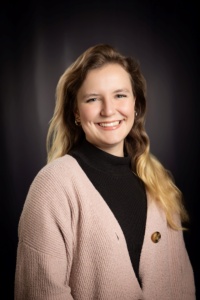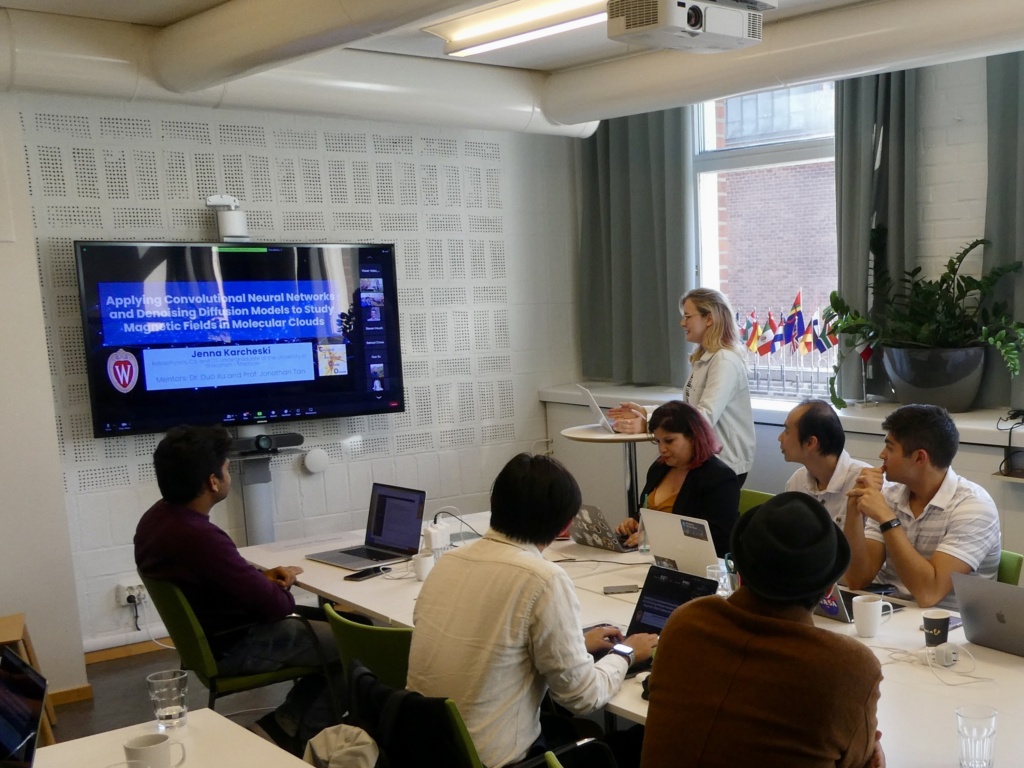Since she was 10 years old, Jenna Karcheski x’25 knew she wanted to be an astrophysicist.
Growing up in Stevens Point, Wisconsin, Karcheski always dreamed of attending the University of Wisconsin–Madison. She rooted for the Badgers and fell in love with the campus during visits to see her brother, who also attended UW–Madison.
When she started her academic journey at the university she chose to major in engineering, feeling like it was more ‘down to Earth’ and practical. After taking one astronomy course for fun in her freshman year, her whole trajectory changed.
“I realized that there are many open mysteries in the universe waiting to be solved and, importantly, I could be a part of solving them,” says Karcheski
 In addition to Astrophysics, Karcheski is also majoring in Computer Sciences (CS) and Data Science (DS), as astrophysics involves being proficient in coding and data analysis.
In addition to Astrophysics, Karcheski is also majoring in Computer Sciences (CS) and Data Science (DS), as astrophysics involves being proficient in coding and data analysis.
“My interests are focused on how we can use AI to aid in the analysis of astronomical data. There’s a lot we can’t do with normal statistical or brute force methods because of the sheer size of these datasets. There are some analysis pipelines and simulations that simply take too long to run by traditional means. Machine learning can also help us uncover subtle patterns and structures in the universe that the human eye couldn’t pick up on,” says Karcheski.
Karcheski is among the 49% of CDIS students who are pursuing multiple majors. She enjoys finding connections between her three different majors and believes it will enhance her job prospects in the future.
“I love learning new skills in my CS and DS classes and being able to apply it right away to my research. It’s almost like a game to me to go through class material and find ways I can apply it to Astrophysics. It’s a lot of work, but being equipped with the skills that I learn in all three of my programs is worth it.” says Karckeski.
As a woman in three male-dominated fields, Karcheski says that it can be isolating going to lectures when she is one of the only women in the room. However, she has relied on her community to help support her.
“I could have never made it this far without my friends, mentors, family, community, and leaders in the field who have worked to improve conditions for women in STEM. Throughout the years, I’ve learned to celebrate myself and others for the things that make us different. There will always be obstacles in the way, but practicing gratitude helps me stay resilient,” says Karcheski.
As an undergraduate student, Karcheski has had the opportunity to participate in different research projects. Through her research she has been able to explore and collect data on exoplanets at Bell Burnell Observatory and study intergalactic medium and how it fits into the map of nearby galaxies. She has been able to take the knowledge she learned in her computer and data sciences courses as part of this research, working with large data structures and learning to code Python.
In addition to her research at UW–Madison, she has also had the opportunity to complete two astrophysics research internships, one in Sweden and one in Canada, applying cutting-edge methods in machine learning and AI to help understand the universe.

As an intern at Chalmers University of Technology in Gothenberg, Sweden, she was part of a research group that used machine learning models to study gas and dust in our galaxy. She has also been able to present the research group’s progress at various conferences including the American Astronomical Society meeting and AstroAI at the Harvard Smithsonian Center for Astrophysics. She is also working towards publishing their results.
This summer, she worked as a research intern at the Ciela Institute in Montreal, Canada, studying strong gravitational lensing systems which occur when a far away galaxy is magnified and multiplied by another massive body. She is particularly interested in the characteristics of these massive, dark-matter-filled bodies that are responsible for the lensing effect.
Karcheski says that her internship experiences were transformative, not only learning about the field and affirming her love for astronomy research, but also giving her the opportunity to immerse herself in different cultures and languages.
“I learned that it’s okay to be the ‘dumbest’ one in the room; everyone had to start somewhere. Being the least knowledgeable one in the room means that you are surrounded by people who can help you get smarter. Never be afraid to ask questions, no matter how ‘dumb’ they may seem,” says Karcheski.
After she graduates this spring, she plans on taking a gap year to finish up research projects, find a job in industry, and travel the world. Ultimately, she intends to pursue a PhD in Astrophysics, with the goal of becoming a full-time researcher or professor.
“We all live under the same night sky, but not a lot of people get to look up and understand what lurks beyond the stars. Thinking about how small and fleeting our lives are motivates me to try and contribute something that will be bigger than myself and change our slice of the universe for the better,” says Karcheski.